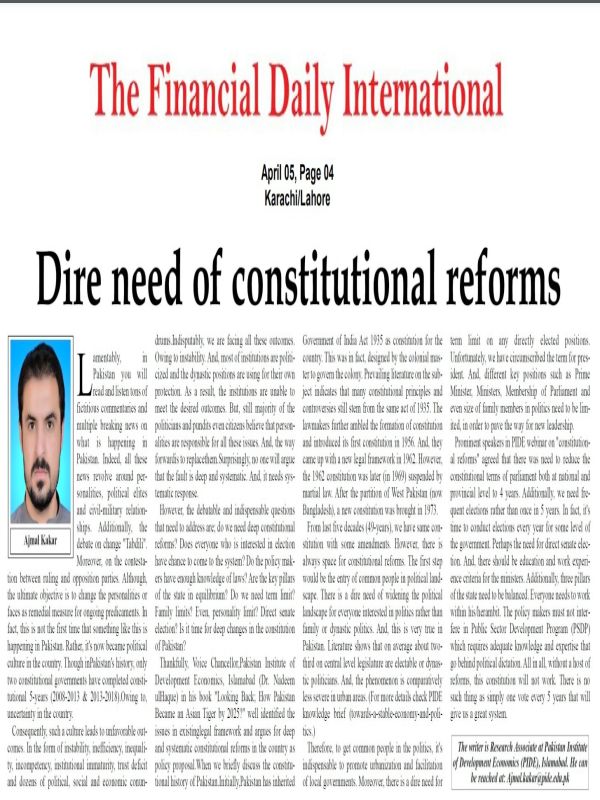
Pakistan Institute of Development Economics
- Home
Our Portals
MenuMenuMenuMenuMenuMenuMenu - ResearchMenuMenuMenuMenuMenuMenuMenu
- Discourse
- The PDR
- Our Researchers
- Academics
- Degree Verification
- Thesis Portal
- Our Portals
Dire need of constitutional reforms
Lamentably, in Pakistan you will read and listen tons of fictitious commentaries and multiple breaking news on what is happening in Pakistan. Indeed, all these news revolve around personalities, political elites and civil-military relationships. Additionally, the debate on change “Tabdili”. Moreover, on the contestation between ruling and opposition parties. Although, the ultimate objective is to change the personalities or faces as remedial measure for ongoing predicaments. In fact, this is not the first time that something like this is happening in Pakistan. Rather, it’s now became political culture in the country. Though inPakistan’s history, only two constitutional governments have completed constitutional 5-years (2008-2013 & 2013-2018).Owing to, uncertainty in the country.
Consequently, such a culture leads to unfavorable outcomes. In the form of instability, inefficiency, inequality, incompetency, institutional immaturity, trust deficit and dozens of political, social and economic conundrums.Indisputably, we are facing all these outcomes. Owing to instability. And, most of institutions are politicized and the dynastic positions are using for their own protection. As a result, the institutions are unable to meet the desired outcomes. But, still majority of the politicians and pundits even citizens believe that personalities are responsible for all these issues. And, the way forwardis to replacethem.Surprisingly, no one will argue that the fault is deep and systematic. And, it needs systematic response.
However, the debatable and indispensable questions that need to address are; do we need deep constitutional reforms? Does everyone who is interested in election have chance to come to the system? Do the policy makers have enough knowledge of laws? Are the key pillars of the state in equilibrium? Do we need term limit? Family limits? Even, personality limit? Direct senate election? Is it time for deep changes in the constitution of Pakistan?
Thankfully, Voice Chancellor,Pakistan Institute of Development Economics, Islamabad (Dr. Nadeem ulHaque) in his book “Looking Back; How Pakistan Became an Asian Tiger by 2025?” well identified the issues in existinglegal framework and argues for deep and systematic constitutional reforms in the country as policy proposal.When we briefly discuss the constitutional history of Pakistan.Initially,Pakistan has inherited Government of India Act 1935 as constitution for the country. This was in fact, designed by the colonial master to govern the colony. Prevailing literature on the subject indicates that many constitutional principles and controversies still stem from the same act of 1935. The lawmakers further ambled the formation of constitution and introduced its first constitution in 1956. And, they came up with a new legal framework in 1962. However, the 1962 constitution was later (in 1969) suspended by martial law. After the partition of West Pakistan (now Bangladesh), a new constitution was brought in 1973.
From last five decades (49-years), we have same constitution with some amendments. However, there is always space for constitutional reforms. The first step would be the entry of common people in political landscape. There is a dire need of widening the political landscape for everyone interested in politics rather than family or dynastic politics. And, this is very true in Pakistan. Literature shows that on average about two-third on central level legislature are electable or dynastic politicians. And, the phenomenon is comparatively less severe in urban areas. (For more details check PIDE knowledge brief (towards-a-stable-economy-and-politics.)
Therefore, to get common people in the politics, it’s indispensable to promote urbanization and facilitation of local governments. Moreover, there is a dire need for term limit on any directly elected positions. Unfortunately, we have circumscribed the term for president. And, different key positions such as Prime Minister, Ministers, Membership of Parliament and even size of family members in politics need to be limited, in order to pave the way for new leadership.
Prominent speakers in PIDE webinar on “constitutional reforms” agreed that there was need to reduce the constitutional terms of parliament both at national and provincial level to 4 years. Additionally, we need frequent elections rather than once in 5 years. In fact, it’s time to conduct elections every year for some level of the government. Perhaps the need for direct senate election. And, there should be education and work experience criteria for the ministers. Additionally, three pillars of the state need to be balanced. Everyone needs to work within his/herambit. The policy makers must not interfere in Public Sector Development Program (PSDP) which requires adequate knowledge and expertise that go behind political dictation. All in all, without a host of reforms, this constitution will not work. There is no such thing as simply one vote every 5 years that will give us a great system.
Ajmal Khan Kakar : The writer is Research Associate at Pakistan Institute of Development Economics (PIDE), Islamabad. He can be reached at: [email protected]



